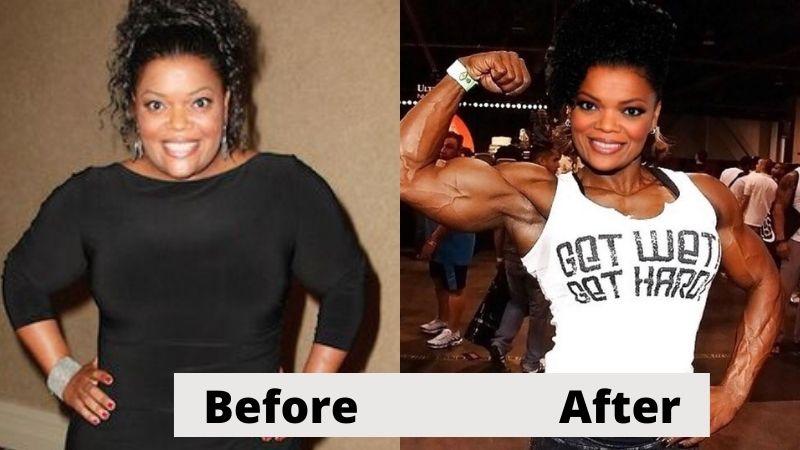Yvette Brown’s Weight Loss Journey: A Public and Personal Transformation: Yvette Brown Weight Loss

Yvette brown weight loss – Yvette Brown’s weight loss journey has garnered significant public attention, sparking discussions about body image, media portrayals, and the complexities of weight management. This analysis explores various aspects of her transformation, examining the public’s perception, the methods employed, potential health implications, the impact on mental well-being, and the role of social media.
Yvette Brown’s Weight Loss Journey: Public Perception

Before her weight loss, Yvette Brown’s public image, like many public figures, was largely shaped by media representations. Specific details about her image prior to her weight loss are not readily available publicly; however, it’s plausible to assume that, like many individuals in the public eye, she may have faced scrutiny regarding her appearance. Following her weight loss, noticeable changes in her appearance were reported in various media outlets. These changes were often highlighted, leading to a shift in public perception. Media portrayals before and after her weight loss likely differed significantly, with a potential emphasis on her physical transformation after the weight loss. Public reaction to her transformation was likely mixed, ranging from admiration and support to potential criticism or speculation about the methods employed. A detailed timeline of media reports surrounding her weight loss journey would require access to specific media archives and publications.
Methods and Strategies Employed
While the precise details of Yvette Brown’s weight loss methods remain largely private, we can speculate on potential strategies based on common approaches. It is likely that a combination of dietary changes, increased physical activity, and lifestyle modifications contributed to her success.
| Method | Description | Potential Benefits |
|---|---|---|
| Dietary Changes | Reduced calorie intake, potentially focusing on whole foods, fruits, vegetables, and lean proteins. Possibly incorporating portion control techniques. | Weight loss, improved nutrient intake, reduced risk of chronic diseases. |
| Exercise Routine | Regular cardiovascular exercise (e.g., running, swimming) and strength training to build muscle mass and boost metabolism. | Improved cardiovascular health, increased muscle strength and endurance, enhanced mood. |
| Lifestyle Modifications | Improved sleep hygiene, stress management techniques, and increased hydration. | Improved overall health, reduced stress levels, enhanced energy levels. |
| Professional Guidance | Consultation with a nutritionist or personal trainer for personalized guidance and support. | Tailored plan, increased accountability, enhanced motivation. |
Potential Health Implications and Benefits, Yvette brown weight loss

Yvette Brown’s weight loss likely resulted in several positive health implications. Weight loss can significantly improve cardiovascular health by lowering blood pressure and cholesterol levels, reducing the risk of heart disease and stroke. It can also decrease the risk of developing type 2 diabetes and improve insulin sensitivity. However, rapid weight loss can also pose potential risks, such as nutrient deficiencies, muscle loss, and gallbladder problems. A holistic approach to weight management, emphasizing sustainable lifestyle changes, is crucial for long-term success and minimizing risks.
Hypothetical Infographic: The infographic would visually represent the balance between positive and negative health effects. A scale could depict weight loss on one side and health improvements (e.g., reduced risk of heart disease, improved blood sugar control) on the other. The negative side would show potential risks (e.g., nutrient deficiencies, muscle loss). Data visualization could use bar graphs or icons to represent the magnitude of each effect, with clear labels and explanations. The overall design should be visually appealing and easy to understand, using contrasting colors to highlight the positive and negative aspects.
Impact on Mental and Emotional Well-being
Significant weight loss can have profound effects on mental and emotional well-being. Positive effects can include increased self-esteem, improved body image, and enhanced confidence. However, negative impacts are also possible, such as anxiety, depression, or body dysmorphia, particularly if the weight loss was driven by unhealthy means or unrealistic expectations. Maintaining weight loss often presents different challenges than the initial weight loss process. Consistent effort, ongoing lifestyle adjustments, and a strong support system are crucial for long-term success. Support systems, including family, friends, and healthcare professionals, can play a vital role in providing encouragement, accountability, and emotional support throughout the journey.
- Seek professional help from a therapist or counselor specializing in body image issues.
- Join support groups or online communities for individuals undergoing weight loss.
- Practice self-compassion and celebrate milestones, no matter how small.
- Prioritize stress management techniques like mindfulness or meditation.
- Focus on overall well-being rather than solely on weight.
The Role of Social Media and Public Influence
Social media likely played a significant role in Yvette Brown’s weight loss journey, both positively and negatively. Public perception and media attention could have provided motivation and encouragement, but also potentially created pressure or unrealistic expectations. Social media can inspire healthy weight loss strategies by showcasing success stories and providing access to resources and support communities. However, it can also promote unhealthy weight loss methods, unrealistic body ideals, and body shaming.
| Social Media Platform | Potential Positive Impact | Potential Negative Impact |
|---|---|---|
| Access to fitness inspiration, healthy recipes, and support groups. | Exposure to unrealistic body ideals, pressure to achieve rapid weight loss. | |
| TikTok | Short, engaging fitness videos and workout routines. | Promotion of fad diets and potentially unsafe weight loss methods. |
| Connection with support groups and communities. | Potential for body shaming and negative comments. | |
| YouTube | Access to educational videos on nutrition, exercise, and weight management. | Exposure to misleading information or potentially harmful weight loss advice. |

